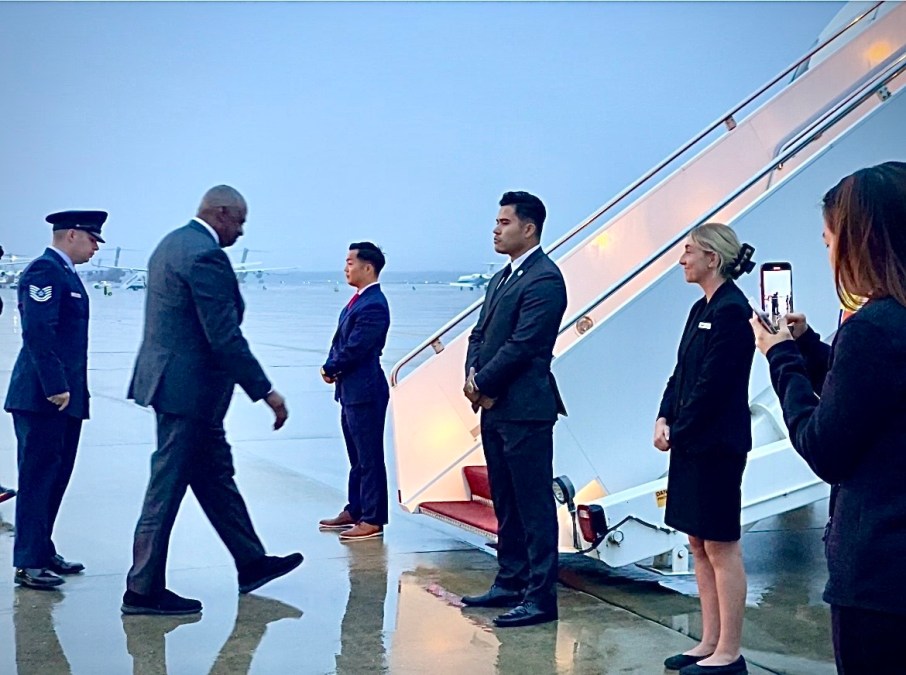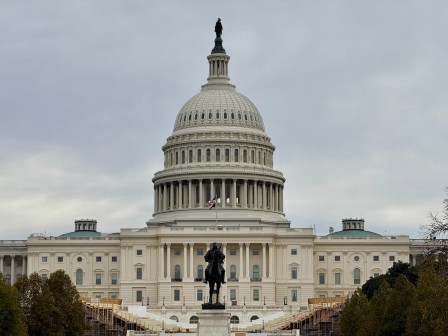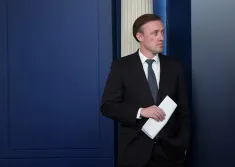Defense leaders set to spotlight joint tech acceleration at AUKUS meetings in London

ABOARD A U.S. MILITARY AIRCRAFT OVER THE ATLANTIC OCEAN — Defense Secretary Lloyd Austin will meet with his British and Australian counterparts in London this week, where they’ll set the path ahead for the AUKUS trilateral security partnership.
During those engagements — the bulk of which are set for Thursday — the secretary aims to discuss new plans to more deeply intertwine the nations’ innovation systems over the next two years to ultimately accelerate emerging technologies that will likely be needed in future fights, according to a U.S. defense official.
“We share a common understanding that we are stronger together. This meeting, the third of its kind, reinforces our commitment on the third anniversary,” Maj. Pete Nguyen told reporters ahead of the summit.
Originally launched in September 2021, AUKUS marks a unique arrangement through which the nations are working to collectively and simultaneously advance their weapons arsenals, improve interoperability of their systems and counter China’s extensive military forces in the Indo-Pacific region.
The AUKUS alliance is currently divided into two primary elements or “pillars.”
Pillar 1 is designed to support Australia’s acquisition of a conventionally armed, nuclear powered submarine capability, while Pillar 2 is meant to enhance cooperation to speed up access to other advanced technologies with defense applications, such as artificial intelligence.
“AUKUS is much more than just submarines. In Pillar 2 we are building a more capable, combined joint force of the future by working across the full spectrum of capability development,” Nguyen noted.
Together, the allies’ procurement, science and technology and operational communities are now “generating requirements, co-developing new systems, deepening industrial base collaboration, and bolstering our innovation ecosystems,” he added.
In terms of tangible progress so far, Nguyen pointed to the recent joint pursuit via which the AUKUS partners deployed P-8A Poseidon aircraft capabilities and processed information from each country’s respective smart sonobuoys to boost maritime domain awareness.
He confirmed that, in addition to that collaboration, “this year, we are further advancing our undersea warfare capabilities by scaling the ability to launch and recover uncrewed underwater systems from torpedo tubes on current classes of British and American submarines that will increase the range and capability of our undersea forces.”
Regarding another high-priority area — long-range strike — Nguyen said the AUKUS members are working to expand their collective capacity to produce offensive and defensive hypersonic technologies through a robust series of trilateral tests and experiments.
“Our efforts are further strengthening the full range of our cyber, electronic and artificial intelligence capabilities. For example, we are now identifying new ways to deliver AI-enabled operational advantage across AUKUS joint missions,” he noted.
In March, the allies demonstrated the ability to train a mission-tailored AI model in real-time, and then deployed it to U.K. and Australian platforms mid-flight, Nguyen also said.
Much of the work has been supported by the International Joint Requirements Oversight Council (I-JROC), a forum set up to strategically pinpoint and validate joint and combined requirements.
“The I-JROC will ensure that capability development considers interchangeability and interoperability from the very start and that the capabilities developed under Pillar 2 solve the most pressing problems across our defense forces,” Nguyen said.
He confirmed to DefenseScoop that, during this ministerial meet-up, Pentagon leadership is also expecting an announcement about the first-ever AUKUS trilateral innovation challenge that was recently conducted by and with the Defense Innovation Unit.






